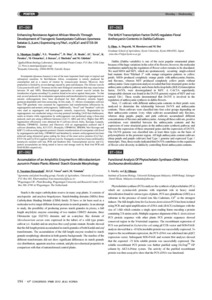Sweetpotato (Ipomoea batatas) is one of the most important food crops in tropical and subtropical countries. In Sub-Saharan Africa, sweetpotato is mainly produced for consumption and as a source of income by resource-poor farmers. However, their production is limited by severe damage caused by pests and diseases. The African weevils Cylas puncticollis and C. brunneus are the main biological constraints that may cause losses between 50 and 100%. Biotechnological approaches to control weevils include the introduction of genes encoding Cry proteins found to be active against these pests. To that end, several protocols for sweetpotato regeneration and transformation by organogenesis or somatic embryogenesis have been developed but their efficiency remains largely genotype-dependent and time-consuming. In this study, 31 African sweetpotato cultivars from CIP genebank were screened for regeneration and transformation efficiencies by organogenesis and somatic embryogenesis. Additionally, “Jewel” and “Jonathan” cultivars were used as organogenic and embryogenic controls, respectively. Regeneration by organogenesis was conducted using a two-step protocol including 2,4-D then thidiazuron, zeatin or kinetin while regeneration by embryogenesis was performed using a three-step protocol, each one using a different hormone (2,4,5-T, ABA and AG3). Higher than 40% regeneration efficiencies were obtained for 8 cultivars (Jewel, Imby, Kawogo, Luapula, Mafutha, CIP440163, Zambezi and Ukerewe) with an organogenesis protocol and 8 cultivars (Jonathan, Imby, K51/3251, Bwanjule, CIP440163, SPK004, New Kawogo and KSP 11) with an embryogenesis protocol. Genetic transformation of sweetpotato with Jewel by organogenesis and Imby, CIP440163 and Jonathan by somatic embryogenesis has been achieved using chimerical genes coding for three of the most active proteins (Cry7Aa1, ET33-34, and Cry3Ca1) against African weevils. Transgenic events have been confirmed by kanamycin resistant calli test, PCR and Southern blot. Transcriptional activity and Cry protein accumulation are being tested in leaves and storage roots by Real time PCR and DAS-ELISA respectively.
Enhancing resistance against African weevils through development of transgenic sweetpotato cultivars (Ipomoea batatas (L.) Lam.) expressing cry7Aa1, cry3Ca1 and ET33-34 genes.
Citation: Manrique Trujillo, S.; Wamalwa, N.L.; Diaz, D.; Reano, R.; Tovar, J.C.; Prentice, K.; Ormachea, M.; Kreuze, J.; Machuka, J.; Guislain, M. 2012. Enhancing resistance against African weevils through development of transgenic sweetpotato cultivars (Ipomoea batatas (L.) Lam.) expressing cry7Aa1, cry3Ca1 and ET33-34 genes. Book of abstracts. 10. International Congress on Plant Molecular Biology. Jeju (Republic of Korea). 21-26 Oct 2012. (Korea). p. 194.
2015-05-19
conference_paper

